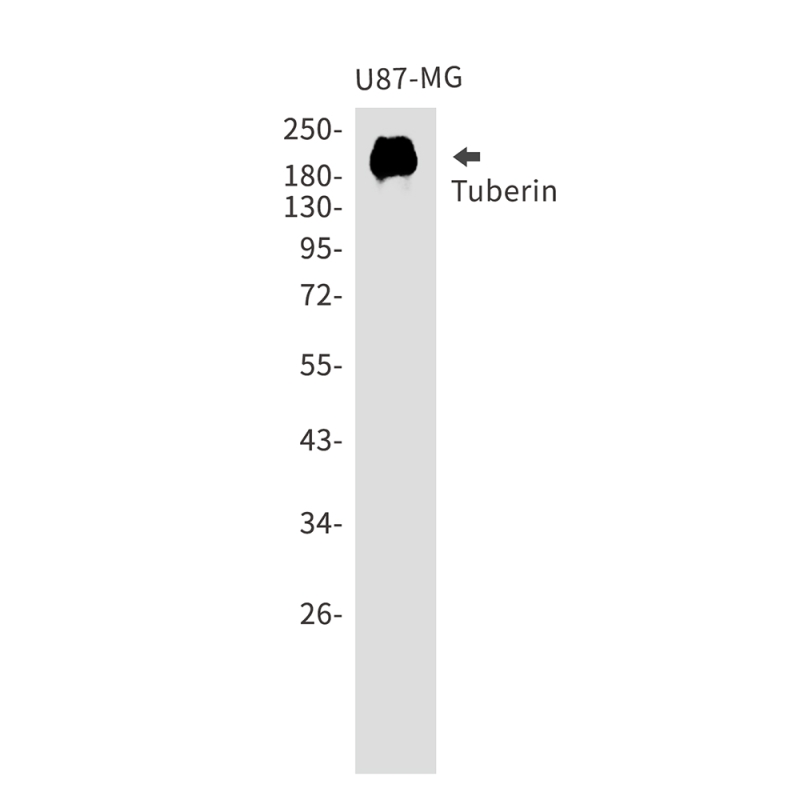
| WB | 1/500-1/1000 | Human,Mouse,Rat |
| IF | 咨询技术 | Human,Mouse,Rat |
| IHC | 1/50-1/100 | Human,Mouse,Rat |
| ICC | 技术咨询 | Human,Mouse,Rat |
| FCM | 1/50-1/100 | Human,Mouse,Rat |
| Elisa | 咨询技术 | Human,Mouse,Rat |
| Aliases | TSC2; Tuberous sclerosis 2 homolog protein; Tuberous sclerosis 2 protein; Tuberin; TSC4 |
| Entrez GeneID | 7249 |
| WB Predicted band size | Calculated MW: 201 kDa; Observed MW: 201 kDa |
| Host/Isotype | Rabbit IgG |
| Antibody Type | Primary antibody |
| Storage | Store at 4°C short term. Aliquot and store at -20°C long term. Avoid freeze/thaw cycles. |
| Species Reactivity | Human,Mouse,Rat |
| Immunogen | A synthetic peptide of human Tuberin |
| Formulation | Purified antibody in TBS with 0.05% sodium azide,0.05%BSA and 50% glycerol. |
+ +
以下是3-4条关于Tuberin(TSC2蛋白)抗体的参考文献及其简要摘要:
1. **"Identification of the tuberous sclerosis complex-2 tumor suppressor gene product tuberin as a target of the phosphoinositide 3-kinase/Akt pathway"**
- **作者**: Mary Nellis, et al.
- **摘要**: 研究通过Western blot和免疫沉淀技术,利用Tuberin抗体验证了PI3K/Akt通路对TSC2蛋白的磷酸化调控,揭示了其在细胞生长抑制中的作用。
2. **"Tuberous sclerosis complex gene products, Tuberin and Hamartin, control mTOR signaling by acting as a GTPase-activating protein complex toward Rheb"**
- **作者**: Ken Inoki, et al.
- **摘要**: 通过免疫印迹(Tuberin抗体)和免疫荧光实验,证明TSC1/TSC2复合体通过抑制Rheb-mTOR通路调控细胞增殖,为肿瘤发生机制提供依据。
3. **"Immunohistochemical analysis of tuberin and hamartin in different tissue types"**
- **作者**: S. Jozwiak, et al.
- **摘要**: 利用特异性Tuberin抗体对结节性硬化症患者组织进行免疫组化分析,揭示了TSC2蛋白在不同器官中的表达缺失与病变相关性。
4. **"Regulation of TSC2 by phosphorylation: novel insights into tuberin function"**
- **作者**: A. Tee, et al.
- **摘要**: 研究通过磷酸化特异性Tuberin抗体,阐明TSC2蛋白的翻译后修饰对其抑制mTOR信号通路能力的影响,提示其在代谢调控中的动态调节机制。
这些文献均涉及Tuberin抗体在分子机制、疾病模型或临床诊断中的应用,涵盖Western blot、免疫沉淀、免疫组化等实验方法。
×